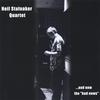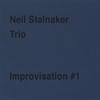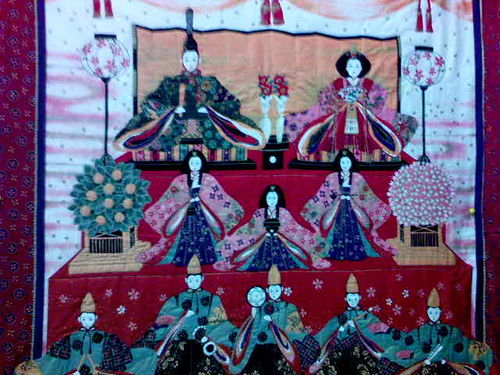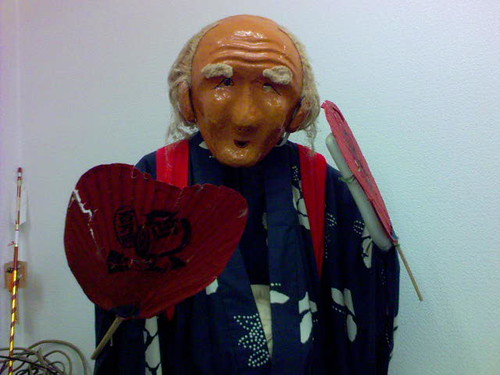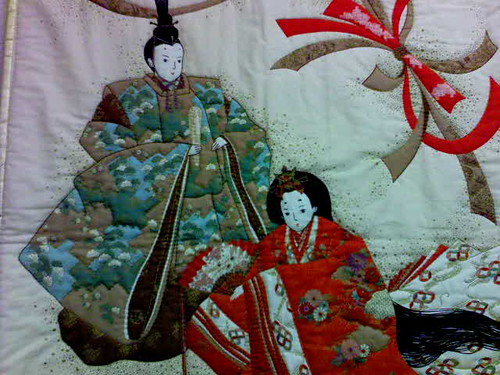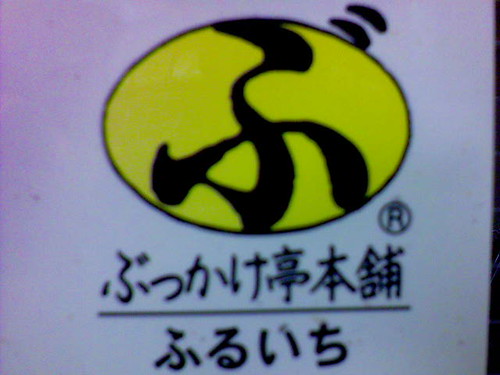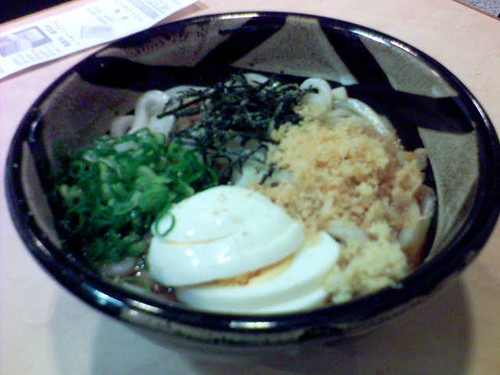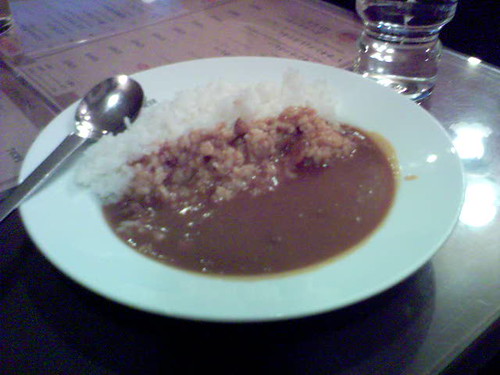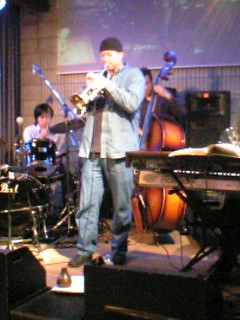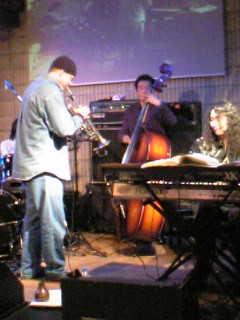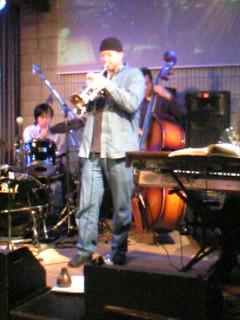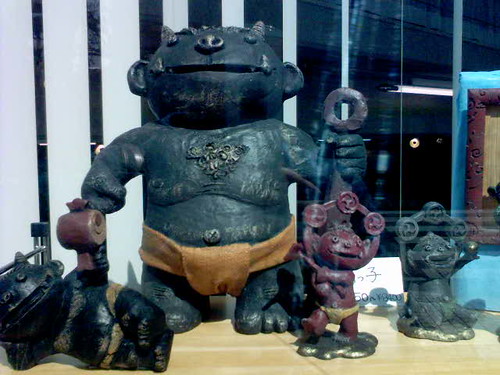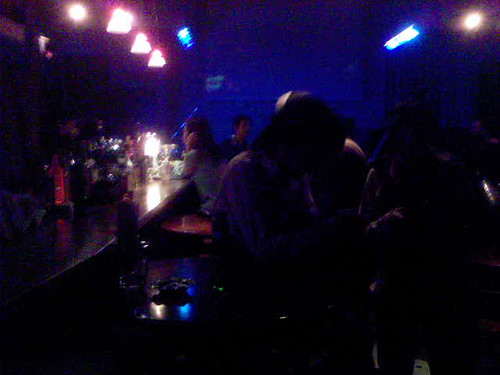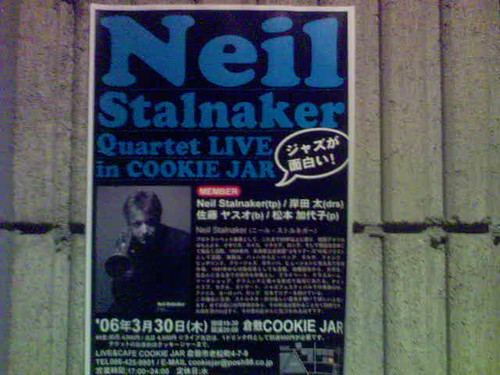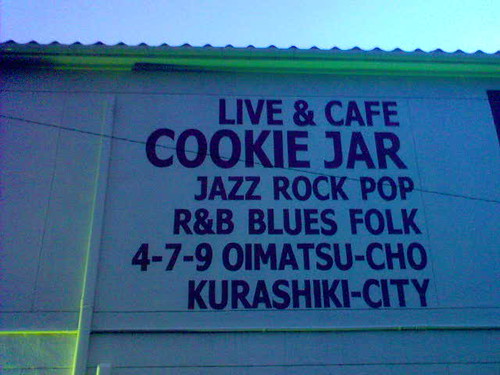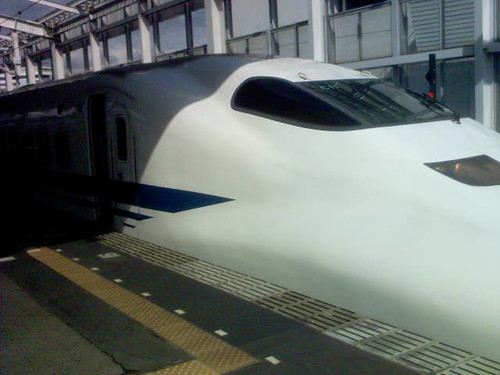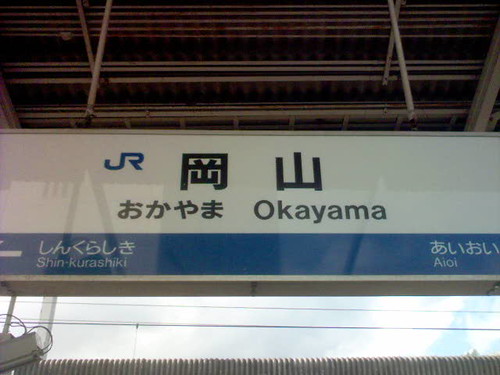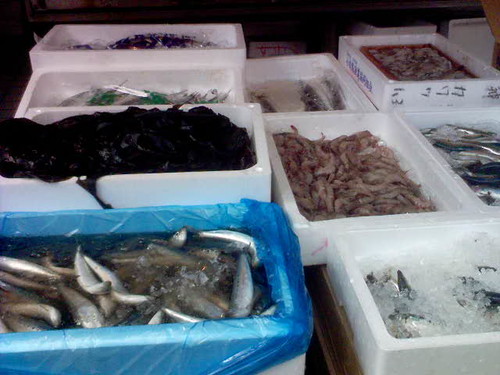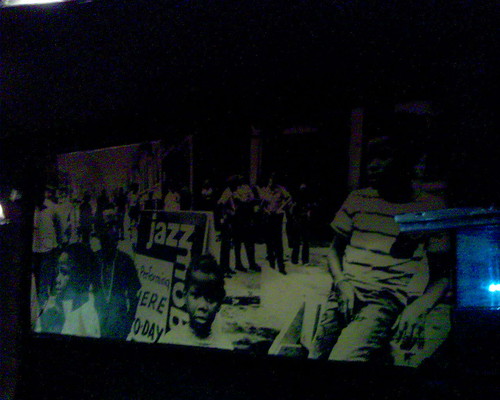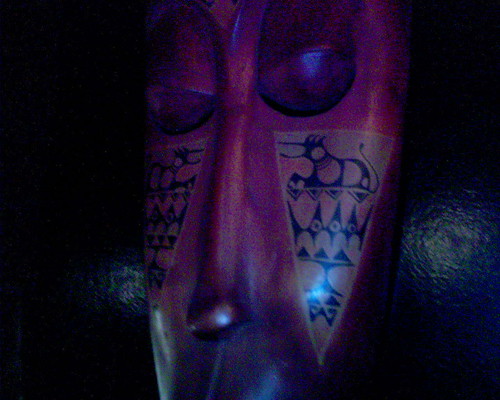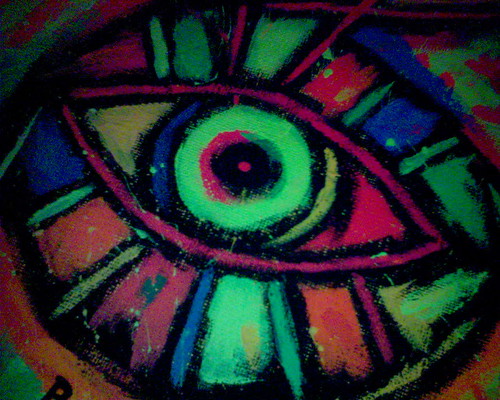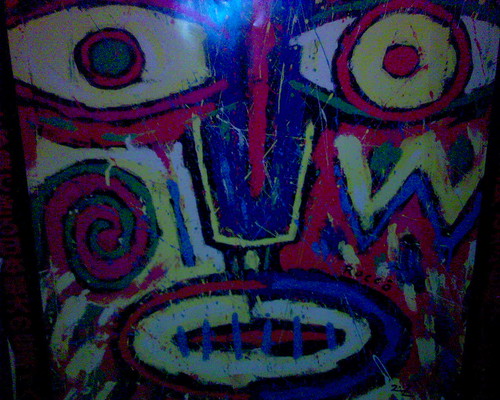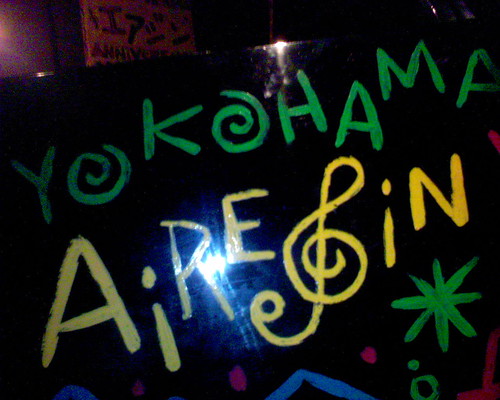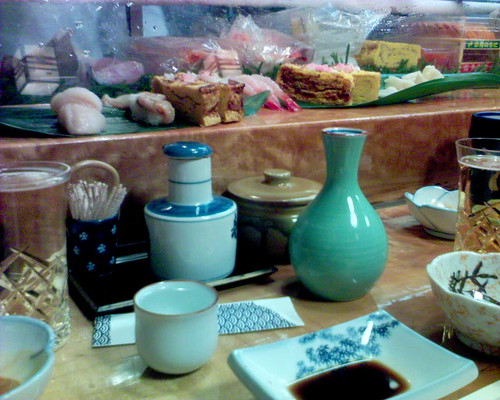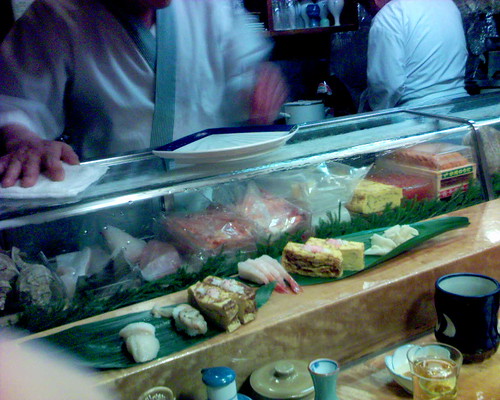Tokyo Nights
Life In Tokyo - Neil Stalnaker
Having a little late afternoon snack...c
Having a little late afternoon snack...curry rice in Kurashika.
Wednesday, March 29, 2006
3/28/06 "Hittin The Books".....
I remember playing a lot of gigs with the great hammond b-3 organ master, Gene Ludwig about 10 years ago. We did dozens of daytime school concerts and sessions at night in clubs. Also, when I got invited to the Montreux Jazz Festival, I took Gene over to play with me in a quartet.
Gene had been playing over 40 years. He used to be in Sonny Stitt's band. I was in awe to be playing with someone from Stitt's band.
Gene had been playing over 40 years. He used to be in Sonny Stitt's band. I was in awe to be playing with someone from Stitt's band.
Gene used to say, "Man, I'm still hittin the books everyday, still in the books everyday learning new tunes."
It was so great to be around a cat like that. After all of those years of playing and practicing, Gene was still hungry to learn more everyday. Often we would go on the gig and play tunes in every key.
It's difficult to call up a tune that he doesn't know. Usually, he only wants to know what key......
It's difficult to call up a tune that he doesn't know. Usually, he only wants to know what key......
3/27/06 Podcast #17
March 27, 2006
After a long "podcast vacation", Neil is back. Talking about the Japanese sakura, his upcoming tour of Japan and future plans for these Tokyo Nights Podcasts.
MP3 File
After a long "podcast vacation", Neil is back. Talking about the Japanese sakura, his upcoming tour of Japan and future plans for these Tokyo Nights Podcasts.
MP3 File
3/23/06 2 Great Gigs......
Last night (Jeff Curry's band, "Outer Rim") and tonight (my "Quartet") were great gigs! So much creative music happening. The gigs were completely different in context but, both shared the same qualities (passion-creativity-freedom). Looking forward to tomorrow (March 25) and Saturday (March 26) with my band, East/West Unit.
Wednesday, March 22, 2006
3/22/06 George Benson......
Went to the DVD rental shop near the house and picked up George Benson Absolutely Live. Sometimes people ask who my favorite musician is. That's a very tough question. How can you answer that question? But, over the past 2-3 years, I've really thought about it a lot. Especially after watching this DVD of his live concert in Ireland and the interview, I have to say without question, my favorite musician is George Benson.
Japanese:
Just went to see a powerful movie. I don't know what to say. I've seen some really good movies recently. Beautiful movies. But, CRASH is very real...touched me in a deep way. I just don't know what to say about it. I feel like it really changed my life in some way. Living in a foreign country, I'm very aware of how we interact and communicate with each other. I don't want to say much. I don't want to ruin the experience. Great movie. A wake-up call.........
Tuesday, March 21, 2006

This Thursday (March 23) I will be playing with my quartet {Inoue Yuichi-piano, Mike Reznikoff-drums and Kenji Yoshitake-bass} at Kenny's in Ikebukuro, Tokyo. We will play 2 sets starting at 8pm. Kenny's is a short 10 minute walk from the west exit of Ikebukuro station. Kenny's (tel)-03-5391-1073 (address)- Ikebukuro 2-63-6
Sunday, March 19, 2006
3/19/06 Fearless (Spirit) Jet Li.........
Went to see a great movie tonight, Spirit (in Japan) - Fearless (USA). Jet Li was soooo good! I think it's the best martial arts film I've ever seen. I'm a huge Bruce Lee fan. However, this movie was just a beautiful movie AND the martial arts part of it was done at such a high level. I really love the motion and movement of Chinese Kung Fu. I especially like the internal martial arts of China...tai chi...hsing yi....bagua. The hardness and the softness...the balance of ying and yang...the circular motion (as opposed to short, rigid, angular movements)...the patience to allow your opponent to commit his/her ki (energy) in a certain direction and then use that to detect weakness...the forms that copy the movements of snakes, dragons, big cats, etc.
I heard this is Jet Li's last movie. It's really good...go see it.
I heard this is Jet Li's last movie. It's really good...go see it.
Saturday, March 18, 2006
3/19/06 Your Thoughts, Your Life.....
Recently read.....
The Dhammapada (translated by Juan Mascaro), Penguin Classics
"What we are today comes from our thoughts of yesterday, and our present thoughts build our life of tomorrow: our life is the creation of our mind."
The Dhammapada (translated by Juan Mascaro), Penguin Classics
3/14/06 Karma.....
Someone said to me recently...
"Just by thinking a negative thought, you create negative karma around you."
Tuesday, March 14, 2006
Berklee Today
Volume 17
Issue No. 3
John Blackwell '95: Putting it in the Pocket:
Did he invite you up there that time so you could rehearse for a tour with him?
Click here to view a great interview of drummer John Blackwell
I was very interested to read that Prince rehearsed his band for 3 months before they went out on tour. Recently, I read about someone in Santana's band. He said they rehearsed 8 hours a day for a month before the Santana tour.
Volume 17
Issue No. 3
John Blackwell '95: Putting it in the Pocket:
Did he invite you up there that time so you could rehearse for a tour with him?
Yes. We rehearsed for three months and then went out on tour. Prince rehearses really hard. He feels like the songs are his children and he asks us to respect the music. You have to play his music right. He would get on the drum set and demonstrate exactly what he wanted me to play. It might not be what a really technical drummer would play, but it's what he wanted. There are certain things about Prince's style, certain signature drum licks, and you just have to play them that way. I grew up listening to his music, so I already knew what he wanted and could do it.
Click here to view a great interview of drummer John Blackwell
I was very interested to read that Prince rehearsed his band for 3 months before they went out on tour. Recently, I read about someone in Santana's band. He said they rehearsed 8 hours a day for a month before the Santana tour.
Monday, March 13, 2006
3/12/06 Music On The Gig....
Recently (the past 6-12 months), I looked back over the past few years of gigs in and around Tokyo and started to try and understand why I had been enjoying some gigs and why other gigs (which often have similarly good conditions) seem to really irritate me and often times "leave a bad taste" in my mouth. The thing that stands out the most at this time is the use of music ("paper") on the gig.
Don't misunderstand. I love reading. Although, I'll be the first to admit that I don't read nearly as much on a daily or even a weekly basis as I did when I was living in Washington, D.C. Most of the gigs that I do here in Tokyo are with my own groups (doing my originals/standards) and as a sideman and doing the same block of standards over and over at every hotel gig. I'm usually playing duo's, trio's and quartets. I don't get called very often for big bands and show gigs in Tokyo. When I was living in Washington, I loved being called at the last minute to do a show, concert or recording session and having to go in and read it down the first time with no rehearsal.
In fact, I remember getting a phone call at 11am and the leader of the "Navy Commodores" Big Band told me he needed me to be at the Pentagon at noon to do a concert. One of their trumpet players skipped town and they needed someone. Since none of the other guys played solos, I went in and sightread the concert and played the solos. I loved it. Actually, that concert ended-up being my audition into the "Commodores". It was a challenge. I did a lot of shows and concerts like this. I remember doing the Temptations, Gatemouth Brown, Four Tops, Frankie Valley, etc shows with a short rehearsal immediately followed by the show.
That being said, I want to be clear where I'm coming from. As I've been coming up since high school wanting to play jazz (or any creative, improvised music), I've had several teachers that told me if I had to use music on a combo gig it was because I didn't know the tune. Greg Hopkins (trumpet teacher at Berklee) used to say this to me all the time. Everynight in the rehearsal rooms at Berklee there were tons of "sessions" going on. You look in the window and everyone was "hidden" behind a music stand looking at their "real book" that probably had wrong chords and/or melody notes. I remember being at Barry Harris' Jazz Workshop on 7th Avenue in New York. He talked so much about studying the tunes. Memorizing the tunes. He often said if you have to use music on the bandstand then you don't know the tune. Period. You use the music because you don't know the tune. I studied with pianist Marc Copeland for a few years in D.C. I never went into a lesson with a leadsheet to a song. I memorized the melody, the chord changes and usually had listened to at least one version of the tune enough that I could sing someone's improvised solo, note for note with the recording in the lesson.
So, I've grown up having been taught that if you don't know the tune, you should probably get off the bandstand or maybe even go home and do your "homework" and then come back and play your ass off.
For me, the most important aspect of doing improvised music is the communication with my fellow musicians. I want to tell a story. I want to go on a journey. But, I don't want to do that alone. I want it to be a group effort. That creates more excitement. It creates more "buzz" in the room. I want to draw the energy of the audience into what we are doing. When all the members are "in the zone" together, real magic can happen. But, what does it mean to be "in the zone?" Well, there have been several books written about that subject. Very simply, I think (based on my experience only!) being "in the zone" is "being present"..."here and now." For some reason my mind has chosen (maybe for only a short period of time) to stop dwelling on the past and worrying about the future. That leaves only the present.
One of my favorite writers and thinkers is Alan Watts. In his book, "The Wisdom Of Insecurity", Watts writes.....
Watts writes.....
It's impossible to be looking at a tune that you don't know, that you haven't absorbed, and effectively communicate with the other "cats" on the bandstand. Period.
I did a gig recently with a singer and her band. She was apologizing to me on the bandstand because she didn't have copies of all the songs for me. She was busy running around in front of the audience passing out tunes to the band. I told her not to worry about it. I didn't really want all that paper in front of me anyway. She said she had heard from a lot of my students that I hate to have music on the bandstand. Well....that's right. With gigs being set-up 2-4 months in advance, I can't understand why a bandleader can't sit down and decide what they want to do on the gig. Maybe, give a list of tunes and keys to players in advance. Of course, if these are players that know tunes, then it's not necessary. But, no one knows every tune. If a bandleader wants to do originals and/or original arrangements of standards, why not put a "book" together. Years ago, I always used to hear musicians talking about trying to learn and/or memorize the music in so-and-so bandleader's "book".
I did a few gigs with the great drummer, Tommy Campbell's band. He had me to come over to his house about 2 months before the gig. Gave me a nice folder with all the music and had 2 discs of music for me to study. This was his "book". The Tommy Campbell band "book". He had obviously put a lot of time into preparing his "book" for all the guys in the band. I worked on that music 1-2 hours /day for 2 months before the gig. Mannn, when I did that gig I felt so relaxed and ready to make music. He is a professional. He has put thought into his project. His project is important to him and when he brings you "in", you can feel that he is totally committed to this "thing" being done on a high level. He doesn't come down to your level. His energy forces you to raise the "level of your game."
Recently, did a tour that started with 1 1/2 days of rehearsal, a day-off and then 3 weeks of concerts. There were really some wonderful players in the band. So, I didn't want to be distracted by having the sheet music for 12 songs in front of me every night. So, during the first 3-4 days, I memorized all the tunes and was able to just relax and focus on what was going on around me AND it freed me up to be aware of the energy in the room....the audience.
As a teacher, I've been observing students coming into final exams with music for a 32 bar tune. I'm thinking.....WHAT! You have 12 weeks to get a tune together and now you come into perform for us with the music and a play-a-long CD. Sheet music and no "live" musicians to communicate with. What are we teaching young people now? Seems like that idea of being totally "in the moment" and communicating with others is given the lowest priority.
I used to go 2-3 times a week to "hang" with my R&B buddies. Never did see any paper on the bandstand. Never did see a singer looking at the words on the bandstand. It would have never been tolerated in the context of what they were doing. A context of excellence. A context that said, "You better get your crap together at home before the gig or you might not have a gig to come to next week."
I go to hear a rock band....I don't see any paper. Rock musicians talk about their "project." They have "project" bands. Maybe they rehearse in somebody's basement for 2-3 years before they ever play live. A project. Intention. Preparation. Band sound.
I go to a festival and hear some country bands. I don't see any paper.
I go to a classical recital and hear a pianist play from memory for 2 hours.
One last point. The first gig I did in Tokyo 7 years ago was a trio (trumpet, bass, and piano) gig at a very small club in Ikebukuro. The music charge was about $60. I was in shock! I couldn't believe ANYONE would pay $60 to come and hear me play. Well, it was a fun evening and the place was full. But, during the last 7 years I've paid attention to the high prices that customers have had to pay to come out and listen to and support what we are doing. However, time and time again, I feel like the band doesn't put much thought and/or preparation into the performance. Everyone (musicians) shows up at 5pm. Pass out some music. We stumble through some tunes for 90 minutes. Take a break. And then come back and try to be spontaneous and creative on material that really hasn't been absorbed into the sub-conscious. It takes a band time to come together. To create a band sound. To absorb and gain some mastery over the music. It takes thought. I think it takes intention. There has to be a context created that says, "This is going to be something great.! This band is going to smoke! You better come and hear this thing!" I remember hearing about a Brandford Marsalis tour. Somebody asked why they were doing the same tunes every night for many months. He wanted to get the band on a really deep level of communication. I heard stories of the Basie band on the road. They were going down the road in the bus and the whole was singing their parts. Sometimes they played the whole night without any charts. I've had guys want me to change the tunes in my band after a couple of months of playing 2-3 times a month and they didn't even have the "book" memorized yet! I played in a 10-piece salsa orchestra in Washington, D.C. It was a great band! It took me 5-6 months to learn and memorize the "book". We played 5 sets a night. But, after I had that book together, that became the most fun gig of my life! That gig was sooo tough. That band played with so much fire and passion. I had to sleep all day on Saturdays to recover from Friday's gig and to be ready to go again Saturday night. But, I had eliminated a huge distraction by memorizing the "book." I felt more free and able to really listen to what was going on around me in the band and to pay attention to the energy in the room. And talking about connecting with the audience. That band could really connect!!!
Don't misunderstand. I love reading. Although, I'll be the first to admit that I don't read nearly as much on a daily or even a weekly basis as I did when I was living in Washington, D.C. Most of the gigs that I do here in Tokyo are with my own groups (doing my originals/standards) and as a sideman and doing the same block of standards over and over at every hotel gig. I'm usually playing duo's, trio's and quartets. I don't get called very often for big bands and show gigs in Tokyo. When I was living in Washington, I loved being called at the last minute to do a show, concert or recording session and having to go in and read it down the first time with no rehearsal.
In fact, I remember getting a phone call at 11am and the leader of the "Navy Commodores" Big Band told me he needed me to be at the Pentagon at noon to do a concert. One of their trumpet players skipped town and they needed someone. Since none of the other guys played solos, I went in and sightread the concert and played the solos. I loved it. Actually, that concert ended-up being my audition into the "Commodores". It was a challenge. I did a lot of shows and concerts like this. I remember doing the Temptations, Gatemouth Brown, Four Tops, Frankie Valley, etc shows with a short rehearsal immediately followed by the show.
That being said, I want to be clear where I'm coming from. As I've been coming up since high school wanting to play jazz (or any creative, improvised music), I've had several teachers that told me if I had to use music on a combo gig it was because I didn't know the tune. Greg Hopkins (trumpet teacher at Berklee) used to say this to me all the time. Everynight in the rehearsal rooms at Berklee there were tons of "sessions" going on. You look in the window and everyone was "hidden" behind a music stand looking at their "real book" that probably had wrong chords and/or melody notes. I remember being at Barry Harris' Jazz Workshop on 7th Avenue in New York. He talked so much about studying the tunes. Memorizing the tunes. He often said if you have to use music on the bandstand then you don't know the tune. Period. You use the music because you don't know the tune. I studied with pianist Marc Copeland for a few years in D.C. I never went into a lesson with a leadsheet to a song. I memorized the melody, the chord changes and usually had listened to at least one version of the tune enough that I could sing someone's improvised solo, note for note with the recording in the lesson.
So, I've grown up having been taught that if you don't know the tune, you should probably get off the bandstand or maybe even go home and do your "homework" and then come back and play your ass off.
For me, the most important aspect of doing improvised music is the communication with my fellow musicians. I want to tell a story. I want to go on a journey. But, I don't want to do that alone. I want it to be a group effort. That creates more excitement. It creates more "buzz" in the room. I want to draw the energy of the audience into what we are doing. When all the members are "in the zone" together, real magic can happen. But, what does it mean to be "in the zone?" Well, there have been several books written about that subject. Very simply, I think (based on my experience only!) being "in the zone" is "being present"..."here and now." For some reason my mind has chosen (maybe for only a short period of time) to stop dwelling on the past and worrying about the future. That leaves only the present.
One of my favorite writers and thinkers is Alan Watts. In his book, "The Wisdom Of Insecurity", Watts writes.....
Understanding comes through awareness. Can we, then, approach our experience-our sensations, feelings and thoughts-quite simply, as if we had never known them before, and, without prejudice, look at what is going on? You may ask, "Which experiences, which sensations and feelings, shall we look at?" I will answer, "Which ones can you look at?" The answer is that you must look at the ones you have now.We are clever. We think we can do many things at once. The big word now is multi-tasking. I was crossing the street recently and was almost run over by a car. As I looked into the car going by I could see that the driver was reading a book AND driving at the same time. But, really? At the same time? We think we can split ourselves in half.
There is no experience but present experience. What you know, what you are actually aware of, is just what is happening at this moment, and no more.
Wisdom of Insecurity, pg 81
Watts writes.....
We are seeing, then, that our experience is altogether momentary. From one point of view, each moment is so elusive and so brief that we cannot even think about it before it has gone.I thought about this often. How can I read a tune that I only vaguely know, perform all the tasks that are involved with blowing the trumpet, listen to the piano player, listen to the bass player and drummer all in the same moment? Seems to me that while I'm looking at the music and processing the information on the paper (chord changes, related scale options, melody, melodic options based off the melody, etc), the moment of creation and communication with the other musicians has passed me by. So, I'm not actually in the moment but, reacting to what has just happened. I'm not the cause. I'm the effect. I can't imagine NBA players going up and down the court with the "playbook" in one hand and trying to improvise with 4 other guys doing the same thing. I like to watch carpenters. But, I very rarely see them with a blueprint in their hand while they are hammering some 2x4's together. They have already studied the plan and come to work prepared to cause something to happen.
Wisdom OF Insecurity, pg 82
While you are watching this present experience, are you aware of someone watching it? Can you find, in addition to the experience itself, an experiencer? Can you, at the same time, read this sentence and think about yourself reading it? You will find that, to think about yourself reading it, you must for a brief second stop reading. The first experience is reading. The second experience is the thought, "I am reading."
Wisdom Of Insecurity, pg 83
It's impossible to be looking at a tune that you don't know, that you haven't absorbed, and effectively communicate with the other "cats" on the bandstand. Period.
I did a gig recently with a singer and her band. She was apologizing to me on the bandstand because she didn't have copies of all the songs for me. She was busy running around in front of the audience passing out tunes to the band. I told her not to worry about it. I didn't really want all that paper in front of me anyway. She said she had heard from a lot of my students that I hate to have music on the bandstand. Well....that's right. With gigs being set-up 2-4 months in advance, I can't understand why a bandleader can't sit down and decide what they want to do on the gig. Maybe, give a list of tunes and keys to players in advance. Of course, if these are players that know tunes, then it's not necessary. But, no one knows every tune. If a bandleader wants to do originals and/or original arrangements of standards, why not put a "book" together. Years ago, I always used to hear musicians talking about trying to learn and/or memorize the music in so-and-so bandleader's "book".
I did a few gigs with the great drummer, Tommy Campbell's band. He had me to come over to his house about 2 months before the gig. Gave me a nice folder with all the music and had 2 discs of music for me to study. This was his "book". The Tommy Campbell band "book". He had obviously put a lot of time into preparing his "book" for all the guys in the band. I worked on that music 1-2 hours /day for 2 months before the gig. Mannn, when I did that gig I felt so relaxed and ready to make music. He is a professional. He has put thought into his project. His project is important to him and when he brings you "in", you can feel that he is totally committed to this "thing" being done on a high level. He doesn't come down to your level. His energy forces you to raise the "level of your game."
Recently, did a tour that started with 1 1/2 days of rehearsal, a day-off and then 3 weeks of concerts. There were really some wonderful players in the band. So, I didn't want to be distracted by having the sheet music for 12 songs in front of me every night. So, during the first 3-4 days, I memorized all the tunes and was able to just relax and focus on what was going on around me AND it freed me up to be aware of the energy in the room....the audience.
As a teacher, I've been observing students coming into final exams with music for a 32 bar tune. I'm thinking.....WHAT! You have 12 weeks to get a tune together and now you come into perform for us with the music and a play-a-long CD. Sheet music and no "live" musicians to communicate with. What are we teaching young people now? Seems like that idea of being totally "in the moment" and communicating with others is given the lowest priority.
I used to go 2-3 times a week to "hang" with my R&B buddies. Never did see any paper on the bandstand. Never did see a singer looking at the words on the bandstand. It would have never been tolerated in the context of what they were doing. A context of excellence. A context that said, "You better get your crap together at home before the gig or you might not have a gig to come to next week."
I go to hear a rock band....I don't see any paper. Rock musicians talk about their "project." They have "project" bands. Maybe they rehearse in somebody's basement for 2-3 years before they ever play live. A project. Intention. Preparation. Band sound.
I go to a festival and hear some country bands. I don't see any paper.
I go to a classical recital and hear a pianist play from memory for 2 hours.
One last point. The first gig I did in Tokyo 7 years ago was a trio (trumpet, bass, and piano) gig at a very small club in Ikebukuro. The music charge was about $60. I was in shock! I couldn't believe ANYONE would pay $60 to come and hear me play. Well, it was a fun evening and the place was full. But, during the last 7 years I've paid attention to the high prices that customers have had to pay to come out and listen to and support what we are doing. However, time and time again, I feel like the band doesn't put much thought and/or preparation into the performance. Everyone (musicians) shows up at 5pm. Pass out some music. We stumble through some tunes for 90 minutes. Take a break. And then come back and try to be spontaneous and creative on material that really hasn't been absorbed into the sub-conscious. It takes a band time to come together. To create a band sound. To absorb and gain some mastery over the music. It takes thought. I think it takes intention. There has to be a context created that says, "This is going to be something great.! This band is going to smoke! You better come and hear this thing!" I remember hearing about a Brandford Marsalis tour. Somebody asked why they were doing the same tunes every night for many months. He wanted to get the band on a really deep level of communication. I heard stories of the Basie band on the road. They were going down the road in the bus and the whole was singing their parts. Sometimes they played the whole night without any charts. I've had guys want me to change the tunes in my band after a couple of months of playing 2-3 times a month and they didn't even have the "book" memorized yet! I played in a 10-piece salsa orchestra in Washington, D.C. It was a great band! It took me 5-6 months to learn and memorize the "book". We played 5 sets a night. But, after I had that book together, that became the most fun gig of my life! That gig was sooo tough. That band played with so much fire and passion. I had to sleep all day on Saturdays to recover from Friday's gig and to be ready to go again Saturday night. But, I had eliminated a huge distraction by memorizing the "book." I felt more free and able to really listen to what was going on around me in the band and to pay attention to the energy in the room. And talking about connecting with the audience. That band could really connect!!!
Sunday, March 12, 2006
3/11/06 The War Of Art

Want to read a great book about taking action in your life.....discovering why you resist that thing you should be doing right now....pick-up THIS book! It's a great read. A fast read. Little "bombs of awareness" exploding in my mind as I read this today at Anniversaire (my favorite cafe in Tokyo), in Omotesando. Sooo many ideas about unlocking your creativity.
I was chatting a couple of nights ago with my "buddy" from college, Perry. He's doing great things in Philadelphia right now with his company, Main Line Interactive. He told me I should get this book. So, while we were chatting on SKYPE, I ordered it on line and 2 days later had it delivered to my door.
Amazon. com
Amazon Japan
I was chatting a couple of nights ago with my "buddy" from college, Perry. He's doing great things in Philadelphia right now with his company, Main Line Interactive. He told me I should get this book. So, while we were chatting on SKYPE, I ordered it on line and 2 days later had it delivered to my door.
Amazon. com
Amazon Japan
Friday, March 10, 2006

Spring 2006 Japan Tour
3/29 Cafe Yorozuyasoubei Kobe, Japan
Katsuko Tanaka-piano
Takuya Sakazaki-bass
Takehiro Shimizu-drums
3/30 Cookie Jar Okayama, Japan
Kayoko Matsumoto-piano
Yasuo Sato-bass
Futoshi Kishida-drums
4/01 SOHO Hiroshima, Japan
Suetoshi Shimizu-tenor sax
Noriko Asari-piano
Dan Miura-bass
Ken Hasegawa-drums
4/02 New Combo Fukuoka, Japan
Hiroaki Kawasaki-piano
Ichiro Masui-bass
Aki Harada-drums
4/04 Doxy Nagoya, Japan
Kunio Ota-piano
Naoki Yohioka-bass
Hideo Kanda-drums
CLICK HERE TO DOWNLOAD PDF FILES OF FLYERS
Tuesday, March 07, 2006


Went to see this new George Clooney movie. Loved it! Go see it!
CLICK HERE TO GO TO THE SYRIANA WEBSITE
Monday, March 06, 2006
One of my favorite TV shows in the USA has been a PBS show called, FRONTLINE. They do documenties on a lot of very interesting topics.
Last night, I watched one of the most recent episodes called, THE METH EPIDEMIC. It was shocking! I have been hearing from people back in the USA that it is a bad situation. Recently, 6 houses away from my son's house the police found a "meth kitchen". It REALLY is an unbelievable problem. Although, I don't hear anyone in the government talking about it.
Below are some links that are interesting and enlightening about the "meth epidemic". I've also included a website for one of the 9 companies in the world that produces ephedrine, the most important ingrediant in "meth". As you search the Krebs company website, take a look at their financial page. The annual sales will blow your mind. Also, found out (to my surprise) that Japan has a huge "meth" problem.
The Anti-Meth Site
FRONTLINE - The Meth Epidemic
DEA
Krebs Biochemicals Product List
Krebs Biochemicals Financial Results
Last night, I watched one of the most recent episodes called, THE METH EPIDEMIC. It was shocking! I have been hearing from people back in the USA that it is a bad situation. Recently, 6 houses away from my son's house the police found a "meth kitchen". It REALLY is an unbelievable problem. Although, I don't hear anyone in the government talking about it.
Below are some links that are interesting and enlightening about the "meth epidemic". I've also included a website for one of the 9 companies in the world that produces ephedrine, the most important ingrediant in "meth". As you search the Krebs company website, take a look at their financial page. The annual sales will blow your mind. Also, found out (to my surprise) that Japan has a huge "meth" problem.
The Anti-Meth Site
FRONTLINE - The Meth Epidemic
DEA
Krebs Biochemicals Product List
Krebs Biochemicals Financial Results
 T H E O N L Y B I L I N G U A L E N G L I S H J A P A N E S E J A Z Z M A G A Z I N E
T H E O N L Y B I L I N G U A L E N G L I S H J A P A N E S E J A Z Z M A G A Z I N ECLICK HERE
http://www.jazznin.com/jznFM06Home.htm
Saturday, March 04, 2006
3/04/06 Watching The News...
I watch the news pretty closely everyday. Probably too much. I heard today there have been over 1300 people killed in Iraq in the last week! Over 350 in Baghdad! And then I see these politicians and military analysts sittin' around tables and answering questions about there being a "possible" civil war in Iraq. I heard a "cat" today say (I think it was the senator from Virginia) that it didn't really follow the dictionary definition of a civil war. What planet is this guy livin on? These people think we are that stupid?
Recently, I see so much tension about countries acquiring nuclear technology and today Bush is in India signing a deal to give them technology and assistance to develop their nuclear program. Then he's going to Pakistan tomorrow to try and make them feel comfortable about this deal. Wow! Talking about great timing. We still have people living in tents in Louisiana, Miss. and Alabama. 6 months after Katrina came through.
Heard about a couple of firemen from my hometown area that recently came home after spending a few months in New Orleans trying to help out. They said it's pathetic down there. Said it seems like the USA has forgotten about the victims of Katrina.
I see on the news today that a lot of government funding is going to finish for the Katrina vitctims. But, how much are we continuing to spend in Iraq every month? I don't understand why we don't take care of our homeland.
I was back in my hometown last year and was shocked by the amount of drug use in that little mountain town of West Virginia. Everyone seems scared to say or do anything about it. I was so sad to see the condition of my hometown. Sad and angry. It makes me so angry that people can come into my hometown and screw-up so many young lives.
I used to hear the President (maybe 10-15 years ago) always talking about the "War On Drugs". In the last Presidential election, I didn't hear ANYONE even say the word "drugs". I think they have given up. I love the USA. Even though I'm living in Japan (only to recover from cancer/depression and play trumpet), I love the USA more than ever. But, I'm sick and saddened to see the country drifting so far off course simply because there aren't any strong leaders.
It strikes me in an odd way that we (USA) invade Afghanistan after 911 and since then, the no. 1 producer and distributor of heroin in the world is Afghanistan. They are having record poppy harvests even though the country is crawling with US military.
I get CNN Breaking News Alerts to my cellphone and it justs makes me hurt inside everytime I get one that reports on more young US soldiers being blown-up in Iraq. Over 2000 killed. How many wounded? Hands, feet legs blown off. 10,000...15,000...20,000? They say we are going to stay there until we win. I wonder....how will that look? How will we know that we've won. I'm thinking about all of those families back in those hometowns that are grieving over lost sons and daughters.
The news is so tightly controlled. We never see the real images of war on tv. They would never be able to continue to get support from the general public about these crazy projects if they showed the reality of those situations on the evening news.
Even when I'm playing, what I think is, a horrible gig, I still feel so damn lucky to be a musician. It's just such a beautiful and wonderful thing to make music. Does Bush play an instrument? Cheney? I wonder how many world leaders can get up on the stage and play or sing their ass off? I sometimes hear stories of the leader of North Korea kidnapping Japanese and South Koreans and taking them to North Korea to perform and/or act for him. How sad. Can you imagine?
Recently, I see so much tension about countries acquiring nuclear technology and today Bush is in India signing a deal to give them technology and assistance to develop their nuclear program. Then he's going to Pakistan tomorrow to try and make them feel comfortable about this deal. Wow! Talking about great timing. We still have people living in tents in Louisiana, Miss. and Alabama. 6 months after Katrina came through.
Heard about a couple of firemen from my hometown area that recently came home after spending a few months in New Orleans trying to help out. They said it's pathetic down there. Said it seems like the USA has forgotten about the victims of Katrina.
I see on the news today that a lot of government funding is going to finish for the Katrina vitctims. But, how much are we continuing to spend in Iraq every month? I don't understand why we don't take care of our homeland.
I was back in my hometown last year and was shocked by the amount of drug use in that little mountain town of West Virginia. Everyone seems scared to say or do anything about it. I was so sad to see the condition of my hometown. Sad and angry. It makes me so angry that people can come into my hometown and screw-up so many young lives.
I used to hear the President (maybe 10-15 years ago) always talking about the "War On Drugs". In the last Presidential election, I didn't hear ANYONE even say the word "drugs". I think they have given up. I love the USA. Even though I'm living in Japan (only to recover from cancer/depression and play trumpet), I love the USA more than ever. But, I'm sick and saddened to see the country drifting so far off course simply because there aren't any strong leaders.
It strikes me in an odd way that we (USA) invade Afghanistan after 911 and since then, the no. 1 producer and distributor of heroin in the world is Afghanistan. They are having record poppy harvests even though the country is crawling with US military.
I get CNN Breaking News Alerts to my cellphone and it justs makes me hurt inside everytime I get one that reports on more young US soldiers being blown-up in Iraq. Over 2000 killed. How many wounded? Hands, feet legs blown off. 10,000...15,000...20,000? They say we are going to stay there until we win. I wonder....how will that look? How will we know that we've won. I'm thinking about all of those families back in those hometowns that are grieving over lost sons and daughters.
The news is so tightly controlled. We never see the real images of war on tv. They would never be able to continue to get support from the general public about these crazy projects if they showed the reality of those situations on the evening news.
Even when I'm playing, what I think is, a horrible gig, I still feel so damn lucky to be a musician. It's just such a beautiful and wonderful thing to make music. Does Bush play an instrument? Cheney? I wonder how many world leaders can get up on the stage and play or sing their ass off? I sometimes hear stories of the leader of North Korea kidnapping Japanese and South Koreans and taking them to North Korea to perform and/or act for him. How sad. Can you imagine?
Profile
Contributors
Previous Posts
- Cherry Blossom Time
- Jazz in Tokyo
- Japan | Scoop.it
- Gundersen: U.S. Navy sailors suffered horrific rad...
- Reuters Special Report: Japan's Homeless Recruited...
- ‘Fukushima Fish Ends In Garbage’: Radioactive Fear...
- TEPCO : Nuclear Power Station | Fuel Removal from ...
- "The Tree"
- "Moonlight in Vermont" - Joey DeFrancesco feat. Ho...
- Dr Robert Cassar: Super Mineralized morning tea Mo...
Archives
- 07/01/2005 - 08/01/2005
- 08/01/2005 - 09/01/2005
- 09/01/2005 - 10/01/2005
- 10/01/2005 - 11/01/2005
- 11/01/2005 - 12/01/2005
- 12/01/2005 - 01/01/2006
- 01/01/2006 - 02/01/2006
- 02/01/2006 - 03/01/2006
- 03/01/2006 - 04/01/2006
- 04/01/2006 - 05/01/2006
- 05/01/2006 - 06/01/2006
- 06/01/2006 - 07/01/2006
- 07/01/2006 - 08/01/2006
- 08/01/2006 - 09/01/2006
- 09/01/2006 - 10/01/2006
- 10/01/2006 - 11/01/2006
- 11/01/2006 - 12/01/2006
- 12/01/2006 - 01/01/2007
- 01/01/2007 - 02/01/2007
- 02/01/2007 - 03/01/2007
- 03/01/2007 - 04/01/2007
- 04/01/2007 - 05/01/2007
- 05/01/2007 - 06/01/2007
- 06/01/2007 - 07/01/2007
- 07/01/2007 - 08/01/2007
- 08/01/2007 - 09/01/2007
- 11/01/2007 - 12/01/2007
- 12/01/2007 - 01/01/2008
- 01/01/2008 - 02/01/2008
- 02/01/2008 - 03/01/2008
- 03/01/2008 - 04/01/2008
- 04/01/2008 - 05/01/2008
- 06/01/2008 - 07/01/2008
- 07/01/2008 - 08/01/2008
- 08/01/2008 - 09/01/2008
- 09/01/2008 - 10/01/2008
- 10/01/2008 - 11/01/2008
- 11/01/2008 - 12/01/2008
- 12/01/2008 - 01/01/2009
- 01/01/2009 - 02/01/2009
- 05/01/2009 - 06/01/2009
- 06/01/2009 - 07/01/2009
- 07/01/2009 - 08/01/2009
- 09/01/2009 - 10/01/2009
- 03/01/2010 - 04/01/2010
- 08/01/2010 - 09/01/2010
- 09/01/2010 - 10/01/2010
- 10/01/2010 - 11/01/2010
- 07/01/2012 - 08/01/2012
- 08/01/2012 - 09/01/2012
- 03/01/2013 - 04/01/2013
- 06/01/2013 - 07/01/2013
- 07/01/2013 - 08/01/2013
- 12/01/2013 - 01/01/2014
- 01/01/2014 - 02/01/2014
- 08/01/2015 - 09/01/2015






